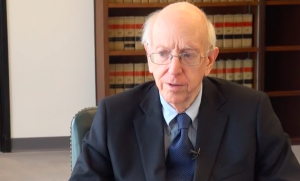Judge Posner Chastises District Court's 'Laziness'... And He's Got A Point
Judges often lift analysis from the parties. This practice has to stop -- especially in pro se matters.

Judge Richard Posner (screenshot via Public Affairs TV / YouTube)
After lighting into the federal judiciary’s treatment of pro se litigants in his first brief in Bond v. United States, Judge Richard Posner finds an opportunity to sharply criticize the government and a federal district judge in his reply brief, filed with the assistance of attorney Matthew Dowd of Dowd Scheffel PLLC.
Perhaps worse yet, the district court’s opinion dismissing Bond’s original complaint was little more than copying and pasting from the Government’s motion. The district court’s laziness leaves a pro se litigant with the perception that the judge did not independently analyze Bond’s complaint. The district court’s actions create the impression of plagiarism and an abdication of its independent judicial duties.

Legal AI: 3 Steps Law Firms Should Take Now
The most damning thing about this paragraph is how unsurprising it is. Judges lift analysis from briefs all the time — and it’s usually flattering — but in a case against a pro se litigant who is unlikely to be fastidious about countering every argument raised by the seasoned attorneys on the other side, copying a brief only reinscribes the inherent power imbalances at play. When this is the case, extensive quotation says less about the substance of an argument than its form.
And lest you think he’s exaggerating about the copying, Judge Posner offers up one extended example in a side-by-side comparison:

And that example goes on for another paragraph.
Sponsored

The Business Case For AI At Your Law Firm


Early Adopters Of Legal AI Gaining Competitive Edge In Marketplace

Navigating Financial Success by Avoiding Common Pitfalls and Maximizing Firm Performance

Early Adopters Of Legal AI Gaining Competitive Edge In Marketplace
The government addresses this charge in a roundabout manner by claiming that Bond’s status as a pro se litigant — and the attendant power imbalance — shouldn’t be relevant in evaluating the case because Bond knew enough to include numbered paragraphs in his complaint. Judge Posner… disagrees:
The Government now takes the extraordinary position that Bond does not deserve the protections given to other pro se litigants. The Government’s position both astounds and offends. Citing not one case to support its position, the Government ignores controlling precedent, both from this Court and the Supreme Court….
The Government seems to believe that, because Bond understood a few court rules, then he should not be treated as a pro se litigant. That is an absurd position.
While this conduct draws the most attention because it’s the most glaring, the rest of the brief takes aim at some of the warrantless claims made by the government and repeated by the district court. Just using the paragraph cited above, the brief and opinion both claim the complaint offers no explanation of how the defendants violated Bond’s rights.
Except… the complaint does that over and over again. As Judge Posner points out, the government appears to have led the district court into making repeated negative inferences regarding Bond’s allegations — a mistake under any interpretation of the law, let alone under the relaxed standards that apply to pro se litigants.
Simply put, Posner’s putting on a clinic down there. Kind of makes you wonder if the Fourth Circuit screwed up in forcing him to enter the case.
Sponsored

Is The Future Of Law Distributed? Lessons From The Tech Adoption Curve

Legal AI: 3 Steps Law Firms Should Take Now
(Check out the full brief on the next page…)
Earlier: Judge Posner Files First Brief Since Leaving The Bench, Lights Into Federal Judiciary
Judge Posner Taking On Pro Se Case After Fourth Circuit Did Something Incredibly Stupid
 Joe Patrice is an editor at Above the Law and co-host of Thinking Like A Lawyer. Feel free to email any tips, questions, or comments. Follow him on Twitter if you’re interested in law, politics, and a healthy dose of college sports news.
Joe Patrice is an editor at Above the Law and co-host of Thinking Like A Lawyer. Feel free to email any tips, questions, or comments. Follow him on Twitter if you’re interested in law, politics, and a healthy dose of college sports news.







